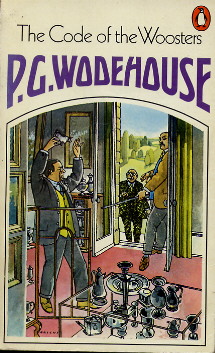P. G. Wodehouse
The Code of the Woosters
Excerpt from chapter 1

P. G. WodehouseThe Code of the Woosters
Excerpt from chapter 1 |

|
[…]
'Man and boy, Jeeves,' I
said, breaking a thoughtful silence which had lasted for about eighty-seven
miles, 'I have been in some tough spots in my time, but this one wins the
mottled oyster.'
We were bowling along in
the old two-seater on our way to Totleigh Towers, self at the wheel, Jeeves
at my side, the personal effects in the dickey.
The more I thought of what
lay before me at these bally Towers, the bowed-downer did the heart become.
'The mottled oyster,' I
repeated.
'Sir?'
I frowned. The man was being
discreet, and this was no time for discretion.
'Don't pretend you don't
know all about it, Jeeves,' I said coldly. 'You were in the next room throughout
my interview with Aunt Dahlia, and her remarks must have been audible in
Piccadilly.'
He dropped the mask.
'Well, yes, sir, I must
confess that I did gather the substance of the conversation.
'Very well, then. You agree
with me that the situation is a lulu?'
'Certainly a somewhat sharp
crisis in your affairs would appear to have been precipitated, sir.'
I drove on, brooding.
'If I had my life to live
again, Jeeves, I would start it as an orphan without any aunts. '
'There is much in what you
say, sir.'
'It is no use telling me
that there are bad aunts and good aunts. At the core, they are all alike.’
'Most disturbing, sir.'
'I wonder how old Bassett
will receive me, Jeeves.'
'It will be interesting
to observe his reactions, sir.'
'He can't very well throw
me out, I suppose, Miss Bassett having invited me?'
'No, sir.'
'On the other hand, he can
- and I think he will - look at me over the top of his pince-nez and make
rummy sniffing noises. The prospect is not an agreeable one.'
'No, sir.'
'I mean to say, even if
this cow-creamer thing had not come up, conditions would be sticky.'
'Yes, sir. Might I venture
to inquire if it is your intention to endeavour to carry out Mrs Travers's
wishes?'
You can't fling the hands
up in a passionate gesture when you are driving a car at fifty miles an hour.
Otherwise, I should have done so.
'That is the problem which
is torturing me, Jeeves. I can't make up my mind. You remember that fellow
you've mentioned to me once or twice, who let something wait upon something?
You know who I mean - the cat chap.'
'Macbeth, sir, a character
in a play of that name by the late William Shakespeare. He was described
as letting "I dare not" wait upon "I would", like the poor cat i' th' adage.'
'Well, that's how it is
with me.’